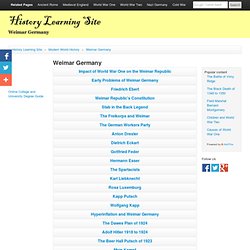

Hitler: 1889-1936 : Hubris - Ian Kershaw. Hitler - Joachim C. Fest. A bestseller in its original German edition and subsequently translated into more than a dozen languages, Joachim Fest's Hitler as become a classic portrait of a man, a nation, and an era.
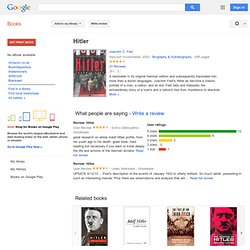
Fest tells and interprets the extraordinary story of a man's and a nation's rise from impotence to absolute power, as Germany and Hitler, from shared premises, entered into their covenant. He shows Hitler exploiting the resentments of the shaken, post-World War I social order and seeing through all that was hollow behind the appearance of power, at home and abroad. Fest reveals the singularly penetrating politician, hypnotizing Germans and outsiders alike with the scope of his projects and the theatricality of their presentation. Fest also, perhaps most importantly, brilliantly uncovers the destructive personality who aimed at and achieved devastation on an unprecedented scale. Hitler - Joachim C. Fest. The Nazi Party: the anatomy of a ... - Paul Madden, Detlef Mühlberger. History Today Article on Streseman. Gustav Stresemann: Weimar's Greatest Statesman Jonathan Wright looks at the career of the statesman who might have steered Germany safely through the Weimar era.
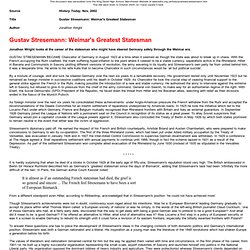
GUSTAV STRESEMANN BECAME Chancellor of Germany in August 1923 at a time when it seemed as though the state was about to break up in chaos. With the French occupying the Ruhr coalfield, the mark suffering hyper-inflation to the point where it ceased to be a viable currency, separatists active in the Rhineland, Hitler in Bavaria and Communists in Saxony plotting different versions of revolution, the army wavering in its loyalty and Stresemann's own party far from united behind him, it was a desperate time. He wrote to his wife Kate that to become Chancellor in such circumstances would be `all but political suicide'. By a mixture of courage, skill and luck he steered Germany over the next six years to a remarkable recovery. Stresemann's diplomacy paid off. The context changed again with the advent of the First World War. A.J. Gustav Stresemann. Gustav Stresemann (1879-1929) was a National Liberal Party deputy in the Reichstag from 1907 and an enthusiastic supporter of ambitious German war aims.
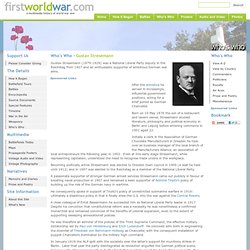
After the armistice he served in increasingly influential government positions, acting for a brief period as German Chancellor. Born on 10 May 1878 the son of a restaurant and tavern owner, Stresemann studied literature, philosophy and political economy in Berlin and Leipzig before entering commerce in 1901 aged 22. Initially a clerk in the Association of German Chocolate Manufacturers in Dresden he took over as business manager of the local branch of the Manufacturers Alliance, an association of local entrepreneurs the following year, in 1902. Even at this early stage Stresemann, while representing capitalism, understood the need to recognise trade unions in the workplace.
A close colleague of Ernst Bassermann he succeeded him as National Liberal Party leader in 1917. His post-war views were stridently right-wing. Gustav Stresemann - Biography. Gustav Stresemann (May 10, 1878-October 3, 1929) was the son of a prosperous owner of a restaurant and tavern.
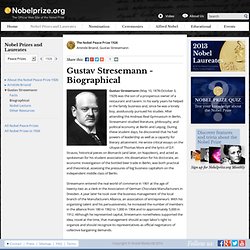
In his early years he helped in the family business and, since he was a lonely boy, assiduously pursued his studies. After attending the Andreas Real Gymnasium in Berlin, Stresemann studied literature, philosophy, and political economy at Berlin and Leipzig. During these student days, he discovered that he had powers of leadership as well as a capacity for literary attainment. He wrote critical essays on the Utopia of Thomas More and the lyrics of D.F. Strauss, historical pieces on Bismarck (and later, on Napoleon), and acted as spokesman for his student association. Stresemann entered the real world of commerce in 1901 at the age of twenty-two as a clerk in the Association of German Chocolate Manufacturers in Dresden.
Always convinced of the relationship between economics and politics, however, Stresemann sought elective office. 1. 2. 3. Copyright © The Nobel Foundation 1926. Weimar Republic. Weimar Germany. Weimar Germany Impact of World War One on the Weimar Republic Early Problems of Weimar Germany Friedrich Ebert Weimar Republic's Constitution Stab in the Back Legend The Freikorps and Weimar The German Workers Party Anton Drexler Dietrich Eckart Gottfried Feder Hermann Esser The Spartacists Karl Liebknecht Rosa Luxemburg Kapp Putsch Wolfgang Kapp.
